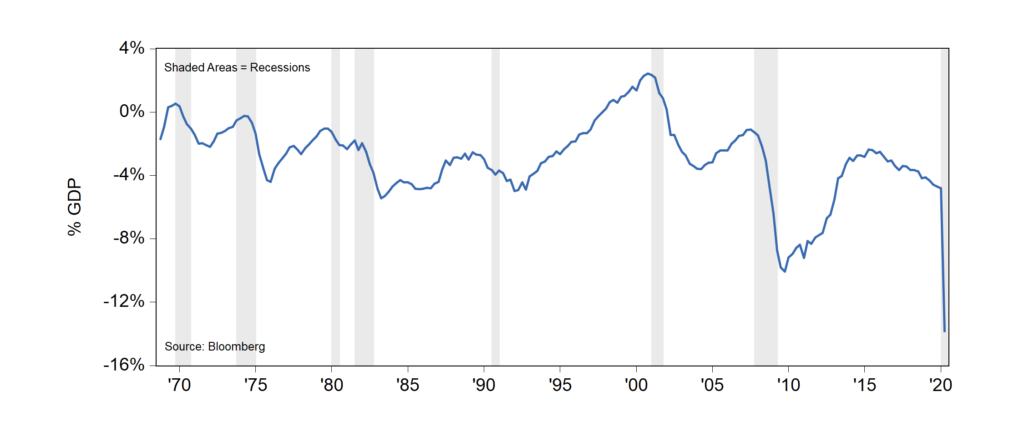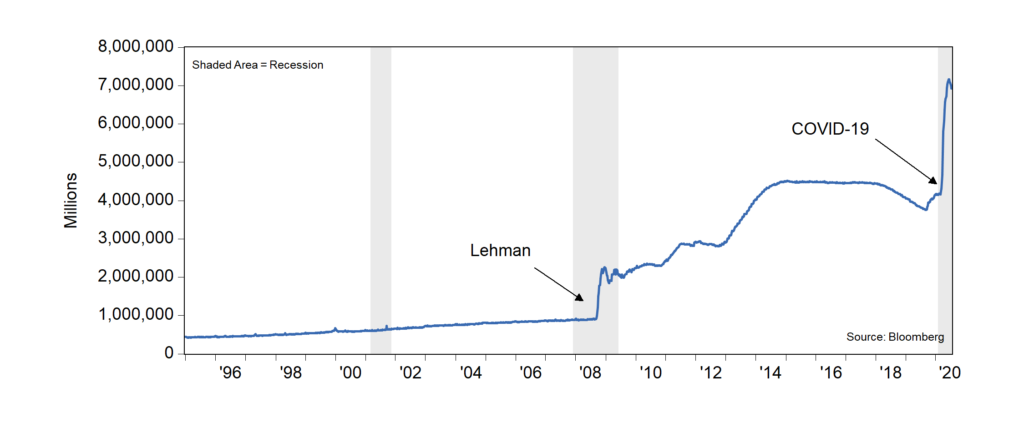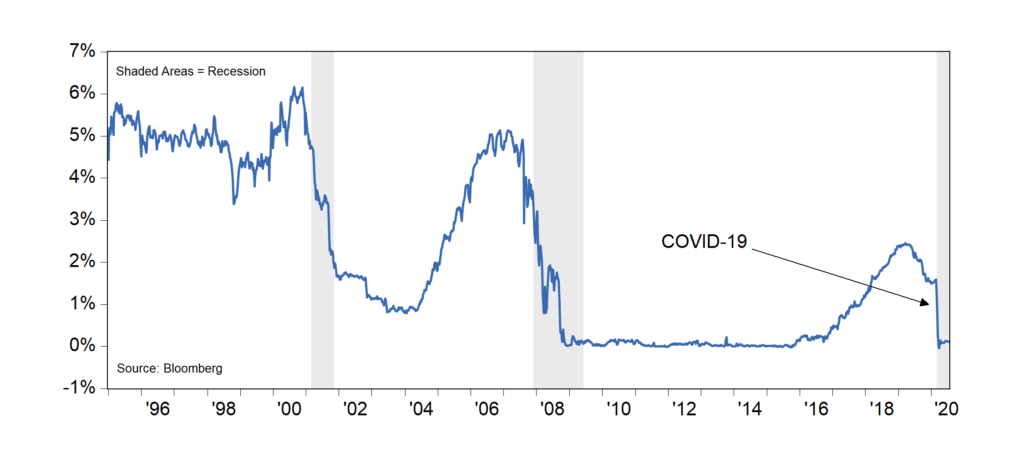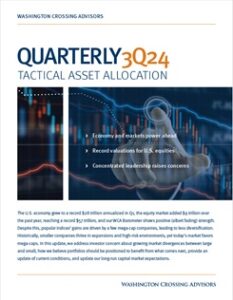Another Round, Please
Negotiations over a second stimulus round are underway, ahead of Congress’ early-August recess. News reports suggest President Trump’s team may be looking for a $1 trillion package focused on payroll deductions and support for unemployed workers that does not create “disincentives” for returning to work. By contrast, the House of Representatives advanced the $3 trillion HEROES bill in May. That bill seeks more significant direct cash payments to individuals, aid for states, and other measures. The GOP is expected to release details of its plan over the next few days. Whatever the final number, this will likely be the last COVID-19 legislative action before November and the elections. A $1-3 trillion package will add to the $2 trillion CARES package, enlarging this year’s deficit. Through June, the U.S. ran a 14% deficit relative to nominal GDP, the largest on record (Chart A, below).
Chart A:
Deficit Reaches Record Levels (%GDP)

Cheap Financing to the Rescue
Since March, the debt is being monetized by the Federal Reserve, having purchased $2 trillion in Treasury securities. The purchases are evident by the substantial increase in assets on the Federal Reserve’s balance sheet (Chart B, below). The central bank also enacted a series of capital market backstop programs as allowed under section 13(3) of the Federal Reserve Act. These actions are even more expansive than those taken following the Lehman Brother’s failure in 2008. The significant increase in Treasury debt to finance COVID-19 private sector payments comes at a fortuitous time because interest rates are at record lows (Chart C, below). In essence, another round of borrowing could be made more palatable by meager borrowing costs.
Chart B
Federal Reserve Asset Purchases Exceed Lehman Crisis

Chart C
Record Low Interest Rates Allow Easy Funding of COVID-19 Deficits

Powerful One-Two Punch
The one-two punch of ultra-accommodative fiscal and monetary policy contributed to the market’s 40% rally since March 23. We believe markets response have become conditioned to policy responses, especially following the financial crisis. Therefore, another round of fiscal and monetary support is important for the bull case (along with progress toward a vaccine/treatment, trade, and the election). A jobless rate of 13%, inflation well below 2% are allowing the United States to finance the current stimulus very inexpensively. Therefore, it is unlikely that another round of stimulus will not be forthcoming, but the size and form are up for debate. This week and next should shed light on the next part of the ongoing and massive U.S. COVID-19 stimulus efforts.
Stay tuned!
Disclosures:
The Washington Crossing Advisors’ High Quality Index and Low Quality Index are objective, quantitative measures designed to identify quality in the top 1,000 U.S. companies. Ranked by fundamental factors, WCA grades companies from “A” (top quintile) to “F” (bottom quintile). Factors include debt relative to equity, asset profitability, and consistency in performance. Companies with lower debt, higher profitability, and greater consistency earn higher grades. These indices are reconstituted annually and rebalanced daily. For informational purposes only, and WCA Quality Grade indices do not reflect the performance of any WCA investment strategy.
Standard & Poor’s 500 Index (S&P 500) is a capitalization-weighted index that is generally considered representative of the U.S. large capitalization market.
The S&P 500 Equal Weight Index is the equal-weight version of the widely regarded Standard & Poor’s 500 Index, which is generally considered representative of the U.S. large capitalization market. The index has the same constituents as the capitalization-weighted S&P 500, but each company in the index is allocated a fixed weight of 0.20% at each quarterly rebalancing.
The information contained herein has been prepared from sources believed to be reliable but is not guaranteed by us and is not a complete summary or statement of all available data, nor is it considered an offer to buy or sell any securities referred to herein. Opinions expressed are subject to change without notice and do not take into account the particular investment objectives, financial situation, or needs of individual investors. There is no guarantee that the figures or opinions forecast in this report will be realized or achieved. Employees of Stifel, Nicolaus & Company, Incorporated or its affiliates may, at times, release written or oral commentary, technical analysis, or trading strategies that differ from the opinions expressed within. Past performance is no guarantee of future results. Indices are unmanaged, and you cannot invest directly in an index.
Asset allocation and diversification do not ensure a profit and may not protect against loss. There are special considerations associated with international investing, including the risk of currency fluctuations and political and economic events. Changes in market conditions or a company’s financial condition may impact a company’s ability to continue to pay dividends, and companies may also choose to discontinue dividend payments. Investing in emerging markets may involve greater risk and volatility than investing in more developed countries. Due to their narrow focus, sector-based investments typically exhibit greater volatility. Small-company stocks are typically more volatile and carry additional risks since smaller companies generally are not as well established as larger companies. Property values can fall due to environmental, economic, or other reasons, and changes in interest rates can negatively impact the performance of real estate companies. When investing in bonds, it is important to note that as interest rates rise, bond prices will fall. High-yield bonds have greater credit risk than higher-quality bonds. Bond laddering does not assure a profit or protect against loss in a declining market. The risk of loss in trading commodities and futures can be substantial. You should therefore carefully consider whether such trading is suitable for you in light of your financial condition. The high degree of leverage that is often obtainable in commodity trading can work against you as well as for you. The use of leverage can lead to large losses as well as gains. Changes in market conditions or a company’s financial condition may impact a company’s ability to continue to pay dividends, and companies may also choose to discontinue dividend payments.
All investments involve risk, including loss of principal, and there is no guarantee that investment objectives will be met. It is important to review your investment objectives, risk tolerance, and liquidity needs before choosing an investment style or manager. Equity investments are subject generally to market, market sector, market liquidity, issuer, and investment style risks, among other factors to varying degrees. Fixed Income investments are subject to market, market liquidity, issuer, investment style, interest rate, credit quality, and call risks, among other factors to varying degrees.
This commentary often expresses opinions about the direction of market, investment sector, and other trends. The opinions should not be considered predictions of future results. The information contained in this report is based on sources believed to be reliable, but is not guaranteed and not necessarily complete.
The securities discussed in this material were selected due to recent changes in the strategies. This selection criterion is not based on any measurement of performance of the underlying security.
Washington Crossing Advisors, LLC is a wholly-owned subsidiary and affiliated SEC Registered Investment Adviser of Stifel Financial Corp (NYSE: SF). Registration with the SEC implies no level of sophistication in investment management.



